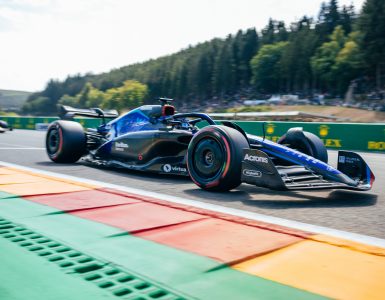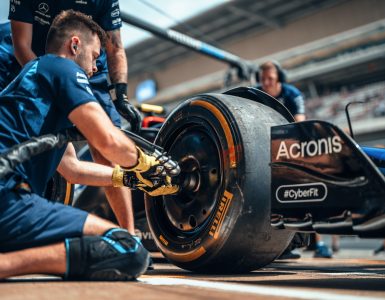It was with this in mind that Acronis caught up with the great Alain Prost, Renault e.dams co-owner and four-time Formula 1 World Champion, specifically about technology in motorsport and the development direction in which the sport is going. Much of what he said reflects what the motorsport governing body is trying to propose.
“We should go back to something more simple: lighter cars, less aerodynamics, and much more mechanical grip. We need to give the drivers and the team more choices, let them choose their tyres and a strategy. Give them more freedom,” said Prost.
“Today, a lot of work is done by the engineers, because it’s all about technology. But I think we went a bit too far. Also, a lot of attention is given to safety — which is good — but as the result, the safety features increased the weight of the car. We’ve been going in the wrong direction and for sure, we need to work on that!”
Prost compared the current situation with the 1993 Formula 1 season, which saw some of the most advanced and sophisticated cars ever built. His championship-winning Williams-Renault FW15C, in addition to the controversial active suspension, was filled with electronic aids and even a “push to pass” system that made overtaking easier down the straights. All these systems, except for telemetry and pneumatic valve springs were banned by the FIA the following season.
1993 Williams-Renault FW15C. YouTube channel Mr. Autosportfan
“I used to work on my car setup myself. Before 1993 I used to tell my engineers, ‘you do this, and you do that,’ or ‘I want this setting’ or ‘that setting was wrong,’ and they did it. In 1993, the only thing I could say was ‘I have understeering,’ or something like that, and Paddy Lowe, who was the engineer at the time, would come out and use a computer to make changes.
“I didn’t like the way the car was set up because I had no say in it. I didn’t like driving it. It wasn’t the same feeling for me. And as you know, all these things were banned in 1994. Now I think we’re back to more or less the same thing.”
Despite returning to the 1993 of today, Prost is confident that both Formula 1 and Formula E will continue to remain relevant to the outside world.
“Over the years, we saw many automotive brands grow very quickly through motorsport. Because you’re touching the environment of the automobile engine, it always leads to an expansion. Motor racing and automobile industry have always followed each other’s paths. Sometimes these paths cross, sometimes they run in parallel. It all depends on the current cycle.
“Today, compared to 20 or 30 years ago, what we expect from motorsport is in fact different. But the automobile industry is different too! Today we’re talking about driverless cars, electric engines — everything is changing. And our sport is changing too.”
When asked whether Formula 1’s future is also electric, Prost was emphatic in his response.
“In my opinion, I don’t think so,” he added. “We have Formula E and it caters for a different type of audience. It uses city tracks and different environment where electric engines are appropriate.
“People going to the city to watch Formula E are often very different from people watching Formula 1. It’s a younger generation, wanting to find out what it is, and maybe see what cars would be like in the future. It’s a different market segment.”
In the wider world of motorsport, and particularly relevant to Acronis where data is always king, Prost touched on this most important of topics.
“The amount of collected data is increasing all the time,” he concluded. “It’s very impressive. Twenty years ago, we were giving information back to the pit about what was happening with the car during the race. Today, engineers see telemetry data in real time half-way across the world and give information to the pit lane engineers all the way from the teams’ factories in different countries. Today, engineers know everything even before the drivers!”
Whilst the motorsport media in general is having a field day discussing the 2021 Formula 1 rule changes, will the sport protect itself from the digital slippery slope? We certainly hope so.
Top image: Alain Prost, Renault e.dams co-owner. © Acronis



